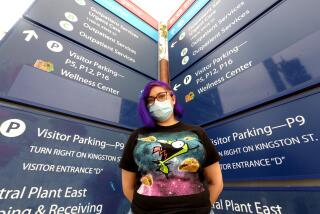Schools Hurt by Shortage of Counselors : Education: Because of budget cuts, students in Glendale and around the state find it increasingly difficult to get advice on college and other matters.
- Share via
GLENDALE — In his first two years at Glendale High School, Scott Greenwood says he has tried 10 times to see his counselor for advice on college, to change his class schedule or to work out some other problem. But each time he’s had to turn elsewhere for help.
“Every student at this school has had a problem when they try to get an appointment with their counselors,” said Greenwood, the school’s incoming student body president. “Sometimes you have to wait three weeks. It’s not the counselors’ fault, though. Their workload is immense.”
Three years ago, the student-to-counselor ratio at the three high schools in the Glendale Unified School District climbed from about 500-to-1 to about 850-to-1, when the district cut its counseling staff 25% to cope with state budget cuts.
Here, and in school districts across the state, the damage to counseling programs has yet to be repaired: students say they’re not getting the guidance they need, and counselors say they are being stretched too thin.
“We go into counseling because we like working with students. We enjoy the interaction, and we want to see them succeed,” said Medea Kalognomos, Glendale High’s head counselor.
“But it’s become very frustrating because there’s not enough time to meet the personal needs of every student. They come to your office and see that you’re rushing and that you’re thinking about 10 different things when you’re working with them. I’ve had students tell me, ‘Take it easy, you’re going to have a heart attack.’ ”
Glendale High School is on the verge of becoming a four-year campus instead of a three-year one. Mindful of the 1,100 new ninth-graders enrolled to begin next month, school officials last week proposed that the jobs of counselors, who traditionally deal in academic and personal guidance, and deans, who handle disciplinary and supervisory chores, be combined to create about half a dozen new administrators called counselor-deans.
School board members called the plan innovative and expressed interest in some of its ideas. But despite pleas from students, parents and school staffers, they rejected it amid concerns that the two jobs could not easily be merged. Still, the situation drew attention to a problem that could plague many middle and high schools until the state replenishes education funds cut during the recession, school officials say.
As cash-short districts have tried to protect core teaching functions from the budget ax, counselors have been vulnerable because their jobs are not required by the state. Student-counselor ratios like Glendale High’s are not uncommon, and in fact some schools have it much worse--at Perris High School in Riverside County, there will be just one counselor next year to service the school’s 1,600 students, a situation one official there called “a joke.”
Other high schools have been forced to do away with accredited counselors, replacing them with clerks who process class schedule paperwork, non-accredited advisers who meet with students on a limited basis, or teachers who double as counselors. In some districts, counselors have remained, but they have been forced to juggle additional duties like part-time teaching.
One of the few school districts to bounce back from the counselor crunch is Los Angeles Unified, which cut about 300 of its secondary school counselors in the early 1990s. The district has rebuilt some of its counseling programs by giving individual campuses control over the way certain funds are spent, officials said.
Belmont High School in Downtown Los Angeles has 4,000 students served by 13 counselors, only five of whom are funded by the district’s budget, said Sara A. Coughlin, an assistant superintendent with the district. The rest are paid for with state and federal funding or with private grants.
“The schools can buy a counselor instead of a reading teacher. They’ve always had that discretion,” Coughlin said. “But they’re still lacking. I don’t think any of our high schools would say they have enough counselors.”
With problems like teen pregnancy, gangs and drugs, today’s high school counselors say they are routinely called upon to intervene in situations that their predecessors seldom encountered. While some schools do have counselors specializing in at-risk youths and crisis situations, often it is the typical guidance counselors who lend a hand.
“We do everything. If a kid comes in and says, ‘I’ve been abused,’ you can’t say, ‘Sorry, I’m balancing classes this hour.’ Everything has to stop, and you focus on that student,” said Kathy Frazer, a counselor at Hoover High School in Glendale.
Frazer said that during her seven years as a counselor, she has intervened in cases where students were contemplating suicide and once assisted a 15-year-old girl who had been raped.
Although the Glendale High proposal added no new counseling jobs, school officials said it would have cut the student-counselor ratio in half, thus doubling the time available for counselors to spend with students. Critics of the plan, some of whom felt it would dilute the role of counselors, now say they hope the school will pursue other ways to add traditional counselors.
“On paper it looked good, because you’re cutting the number of students per adult,” said Susan Bonoff, a counselor at North Hollywood High School and parent of a recent Glendale High graduate. “But it’s tough being a teen-ager today, and I think we need more counselors, not administrators.”
More to Read
Sign up for Essential California
The most important California stories and recommendations in your inbox every morning.
You may occasionally receive promotional content from the Los Angeles Times.













